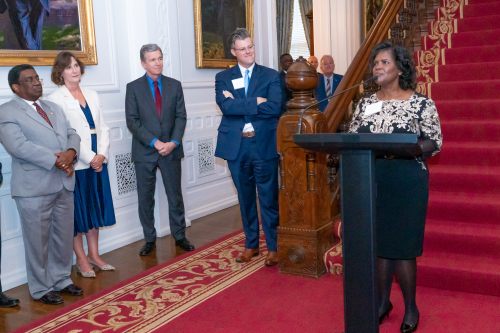

August 23, 2023

On Aug. 9, NCAFP past president Dr. Karen L. Smith received the 2023 Larry Wooten Rural Leadership Award at the Governor’s Mansion in Raleigh. This award recognizes and celebrates individuals who contribute their time, effort, and impact to rural communities in our state. “Dr. Karen L. Smith's commitment to advancing rural health in North Carolina is truly commendable,” said Gov. Roy Cooper at the ceremony. “Her dedication to ensuring that all North Carolina residents have access to quality health care has made a significant impact on rural communities.” Dr. Smith received the 2023 award together with the agricultural advocate L.T. Ward, in recognition of his service to rural communities through sustainable farming and rural development.
NC Dept. of Health and Human Services (NCDHHS) Secretary Kody Kinsley introduced Dr. Smith by saying, “Dr. Smith has been recognized in her career for the last 30 years for not only making a difference in her community, but for showing, frankly, the rest of the country how it needs to be done. She’s leading the way not just for meeting the moment today but for the future.”
In her acceptance speech, Dr. Smith reiterated her commitment to rural communities and to her fellow physicians: “We are here to serve our state, serve our friends, serve our neighbors. Whatever we can do, we are part of this team. We can do what we need to do in North Carolina to achieve healthy and happy communities.”
When she was attending medical school in Philadelphia, Dr. Smith found that her specialist-focused training lacked the comprehensive approach she wanted. “The emphasis was not on Family Medicine,” she says.
However, Dr. Smith was lucky to hear about the specialty from Dr. Updegrove, the chair of the Department of Surgery where she studied. As she tells it, her interest rang a bell for the surgeon: “He said, ‘You care about more than the surgical needs of the patient, and that reminds me of my own father, who was a family physician. Have you ever thought of becoming a family physician?’”
Learning to treat “prevalent issues that face everyday people, every day” became very important to Dr. Smith. After medical school, she completed her residency at the Southern Regional Area Health Education Center (SRAHEC) in Fayetteville (a community-based residency) and in 1992 moved with her family to Raeford, the rural community where she has worked and lived ever since. “We have been here for the duration of our children’s lives,” Dr. Smith says, “and my whole professional life has been here too.”
She explains that the professional and personal key to her life is respect. “Respecting every individual recognizes the unique value he or she possesses,” Dr. Smith says. “As their doctors, we have to help them achieve that value. That starts with respect.”
And what goes in tandem with that respect? Listening. During her long-time involvement with the American Academy of Family Physicians (AAFP), Dr. Smith hears about what other physicians have learned and tried: “There are lots of ideas for solving the same problems. Your goal as a leader should be to listen and hear what people are saying. It’s amazing the nuggets of valuable information that people express. And if you don't listen, you’ll miss it.”
One topic that Dr. Smith has learned plenty about is global health. She says the subject became important to her during her residency: “What was unique about the patient population in residency was that it was a military population, which brought me into global health. We were taking care of people from all over the world, not just people from North Carolina.”
And to those global patients in Fayetteville, as she does now to her Raeford patients, she showed respect first. “There really is something about the familiarity of people living in a community,” Dr. Smith says, “especially when you hear what people are saying.”
She is glad to give all that she learns back to her local community of patients: “Raeford is where I share those ideas I’ve learned from traveling all over the world. I’m going take some of the solutions that other physicians come up with and apply them to our own community. Then, it’ll be time to share with other physicians too.”